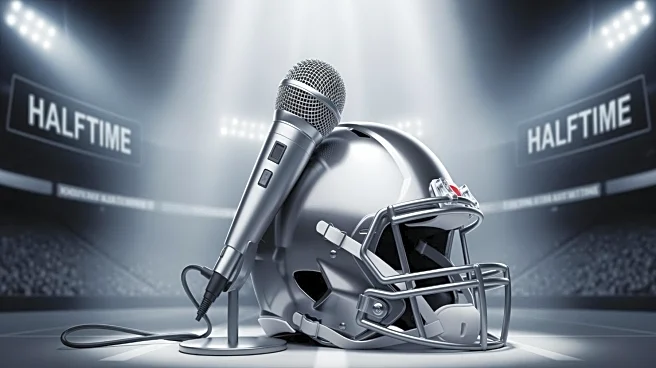What's Happening?
NFL Commissioner Roger Goodell has expressed confidence in Bad Bunny's upcoming performance at the 2026 Super Bowl halftime show, despite criticism from conservative voices. Goodell stated that Bad Bunny,
whose real name is Benito Antonio Martínez Ocasio, was chosen after careful consideration and is expected to deliver a great show. The decision to feature Bad Bunny reflects the NFL's effort to celebrate entertainment and cultural diversity. Goodell acknowledged that criticism is common for Super Bowl performances, but emphasized the importance of creating a united and exciting moment. Bad Bunny has expressed excitement about the opportunity, highlighting its significance for Puerto Rico and Latino communities worldwide. Despite calls from some fans for President Trump to intervene, Goodell confirmed there are no plans to replace Bad Bunny.
Why It's Important?
The selection of Bad Bunny as the Super Bowl halftime performer is significant for its cultural implications, as it highlights the NFL's commitment to diversity and inclusion. This decision may influence public perception of the NFL's stance on cultural representation and could impact its relationship with Latino audiences. The controversy surrounding the performance underscores ongoing political tensions related to immigration and representation, particularly as President Trump and his allies have voiced opposition. The event could serve as a platform for broader discussions on cultural pride and diversity in entertainment, potentially affecting future decisions by the NFL and other major organizations.
What's Next?
The Super Bowl is scheduled for February 8, 2026, at Levi's Stadium in Santa Clara, California. As the event approaches, further reactions from political leaders, fans, and cultural commentators are likely. The NFL may consider additional talent to join Bad Bunny, which could influence the overall reception of the halftime show. The performance itself may spark discussions on cultural representation and diversity in major sporting events, potentially leading to changes in how such events are organized and perceived.
Beyond the Headlines
The controversy surrounding Bad Bunny's performance highlights deeper issues of cultural representation and political tension in the U.S. The involvement of President Trump and his allies in the debate reflects broader societal divisions and the role of entertainment in political discourse. The event may prompt discussions on the ethical responsibilities of major organizations like the NFL in promoting diversity and inclusion, as well as the impact of political figures on cultural events.











